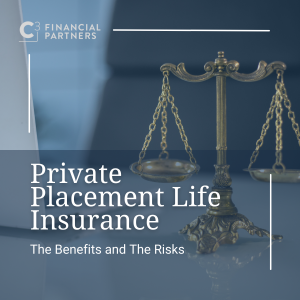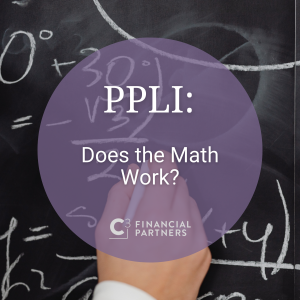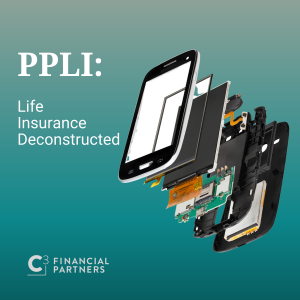Increasingly, the investment community is buzzing about private placement life insurance (PPLI) and the benefits for those who are seeking greater tax-efficiency in their long-term financial planning. Still, many of the individuals qualified to purchase PPLI and their advisors do not understand the concept, including the rewards and the risks. At C3 Financial Partners, we work with affluent clients and their advisors in providing clarity around every component of a PPLI transaction, confidence that the math favors the client, increasing the likelihood that tax benefits will outweigh costs, and coordination with a client’s legal, accounting and investment professionals in establishing a PPLI policy.
Clarity
Where traditional life insurance solutions solve for liability, such as meeting estate taxes or providing liquidity for a family or business, PPLI is more of a wealth management tool combined with a need for life insurance. At its core, PPLI is simply a variable universal life (VUL) contract. As such, there is a cash value component of the contract that can be allocated to variable subaccounts. Unlike traditional retail VUL policies, PPLI also provides access to alternative asset classes via Insurance Dedicated Funds (IDFs) or a Separately Managed Account (SMA). These benefits include deferred inside build-up of the cash value, the ability to take tax-advantaged distributions from the policy, and/or converting the investments into a PPLI policy’s income tax-free death benefit.¹²

Those clients who are attracted to highly tax-inefficient investments such as hedge funds and other alternatives are especially drawn to PPLI and its tax benefits. When these clients live in local and state jurisdictions with high tax rates, the interest in PPLI’s tax benefits is amplified. Is PPLI too good to be true? At the very least, PPLI is not too good to be free of laws, rules, and costs which dictate who can purchase PPLI, how it is structured, and what it costs.
PPLI is a type of variable life insurance whose performance depends almost entirely upon the performance of the underlying investments. There are no product guarantees to protect against negative investment returns and, similarly, the upside is not limited, either. Since the risk of performance is born by the policyholder and not the insurance company, only those individuals who meet the IRS’ definition of a qualified purchaser or accredited investor can purchase PPLI.³
Two additional rules governing PPLI are the requirement to have adequate investment diversification within the policy and a prohibition against the policyholder owner, insured, or a closely affiliated person from making investment decisions. This means that a single, direct investment into a single stock – like Amazon, for example – won’t work and a professional, independent money manager needs to be making all investment decisions. If a client is already comfortable working with a discretionary investment advisor who manages a client’s diversified portfolio, then there should not be an objection to these PPLI rules.

A client’s investment manager can choose either an SMA and/or one or more IDFs to house a PPLI policy’s investments. An SMA under a PPLI policy is no different than a discretionarily SMA a client might have outside of a policy, allowing for direct investment into a broad range of assets (such as stocks, LP interest in private equity or limited liability companies, and third-party promissory notes, etc.) An IDF is an insurance version of a publicly available fund, such as a hedge fund, that only a life insurance company or a life insurance policy can invest in. Often these investment choices will include liquidity restrictions limiting a policyholder’s access to the funds. In either an SMA or IDF, the client’s choice of a money manager – and not the life insurance company – makes investment decisions for a PPLI policy.
There are many nuances in how PPLI works. C3 Financial Partners provides clarity to clients and their advisors in understanding PPLI and evaluating if it may fit within an investment portfolio.
Confidence

For someone considering PPLI, the math has to work. Either the tax benefits outweigh the policy costs and PPLI is worthwhile, or the tax benefits are overwhelmed by costs and the math fails. In order to preserve the tax benefits of life insurance, PPLI must meet the IRS’ definition of life insurance. This means there must be a substantive amount of death benefit coverage in the policy until one of the definitions of life insurance is met.4 After the IRS’ formula has been satisfied, most of the death benefit can be eliminated, greatly reducing policy costs and maximizing the growth of the investments under the policy. Therefore, if a policyholder cannot commit to at least 15 years or longer, they likely will not hold the policy long enough for the math to work and to achieve the tax benefits.
Maintaining the minimum amount of life insurance that the IRS requires for every dollar of investment is critical in enhancing tax efficiency. Fortunately, just over two years ago, Congress and the President passed the Consolidated Appropriations Act of 2021 (the “Act”). This Act changed the IRS’ definition of life insurance so that a policyholder could put up to three times as much premium into many types of life insurance, including PPLI, without the requirement of having to buy more death benefits. Understandably, this was a huge benefit for cost-sensitive PPLI.
This Act also benefited retail variable universal life products (VUL) which may be a suitable alternative to PPLI for many clients. The latest generation of VUL contracts features competitive pricing, a choice of dozens of investment options from brand name managers, and the ability to add performance guarantees. In addition, many VUL contracts allow the policyholder to include low-cost riders to provide funding for long-term care, critical and chronic illnesses, and other health challenges.
When it comes to PPLI, C3 Financials Partners can help provide our clients and their advisors with the confidence to identify all of the potential costs and tax benefits in a PPLI transaction. Either the math works, or it doesn’t. Our team can also help assess if a retail VUL policy is a better fit than PPLI.
Coordination

A big reason many clients and their advisors like the way PPLI is structured is that it takes all the component parts and assigns them to the most suitable party. Instead of the life insurance company holding a client’s money, making all investment decisions, and deciding how much of the returns are assigned to a policy as typically done for traditional policies, matters are handled differently with PPLI. The client is able to choose their manager who, in turn, chooses a policy’s investments. The client or their manager can also choose the custodian of their choice where the investments are held segregated from the insurance company’s general account and not subject to the insurer’s creditors. The life insurance company is then left to provide the required life insurance structure and any death benefit required.
It is important that the activities of each of these parties is coordinated to work towards the best outcome. C3 Financial Partners provides coordination among not only the parties listed but also a client’s legal and accounting advisors who must provide guidance to how a PPLI policy can be positioned in a portfolio but also held outside of the client’s estate.
At C3 Financial Partners, we look forward to helping our clients and their advisors gain clarity in their goals and objectives, confidence that they are making the right decisions, and coordination with other advisors.
¹ Income tax-free loans are available if a policy is structured as a non-Modified Endowment Contract. Access to cash values through borrowing or partial surrenders will reduce the policy’s cash value and death benefit, increase the chance the policy will lapse, and may result in a tax liability if the policy terminates before the death of the insured.
² IRC §101(a)(1)
³ Private placement products offered by U.S. carriers to U.S. persons are subject to SEC regulations. Each purchaser generally must be a “qualified purchaser” under §2(a)(51) of the Investment Company Act of 1940, 15 USC §80a-2(a)(51), and/or an “accredited investor” under §501(a) of Regulation D of the 1933 Act, 17 CFR §230.501(a). A “qualified purchaser” is an individual or a family-owned business that owns $5 million or more in investments. An “accredited investor” is anyone who meets one of the below criteria: Individuals who have an income greater than $200,000 in each of the past two years or whose joint income with a spouse is greater than $300,000 for those years, and a reasonable expectation of the same income level in the current year.
4 IRC §7702
Private Placement Life Insurance (PPLI) is an unregistered securities product and is not subject to the same regulatory requirements as registered products. As such, Private Placement Life Insurance should only be presented to accredited investors or qualified purchasers as described by the Securities Act of 1933. Investments in securities involve risks, including the possible loss of principal. When redeemed, units may be worth more or less than their original value. You should read the PPLI contract and offering documents thoroughly. Investors should consider the investment objectives and horizons, income tax brackets, risks, charges, and expenses of any variable product carefully before investing.
This material has been prepared for informational purposes only, and is not intended to provide, any specific advice or recommendations. Any tax advice contained herein is of a general nature. You should seek specific advice from your tax professional before pursuing any idea contemplated herein.
Securities offered through Valmark Securities, Inc., member FINRA, SIPC. Investment Advisory Services offered through Valmark Advisers, Inc. a Registered Investment Advisor, 130 Springside Drive, Suite 300, Akron, Ohio 44333-2431, 1.800.765.5201. C3 Financial Partners, LLC is a separate entity from Valmark Securities, Inc. and Valmark Advisers, Inc.
 ™
™



